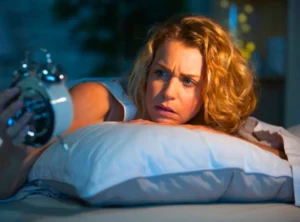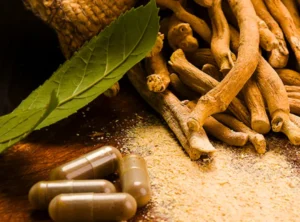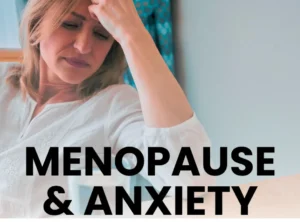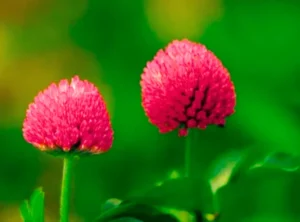Are unexpected waves of intense heat ruining your day? For many women, hot flashes during menopause are a big problem.
Studies show that making lifestyle changes, trying medical treatments, and exploring alternative options can really help. Almost 75% of women deal with hot flashes, making it clear we need good ways to handle them.
Learning about the reasons behind hot flashes and the options available can make a big difference. In this article, we’ll share tips and strategies to ease the discomfort of hot flashes.
The Science of Menopausal Hot Flashes
Learning about menopausal hot flashes can help women deal with them. Hot flashes are a big symptom of menopause, hitting many women during this time.
Hormonal Fluctuations and Thermoregulation
The body’s ability to keep a steady temperature changes with hormones, mainly estrogen. Estrogen is key in controlling body temperature.
Estrogen Decline and the Hypothalamus
The hypothalamus, which keeps the body balanced, is affected by less estrogen. This can cause the feeling of heat, known as hot flashes.
Frequency and Duration Patterns
Hot flashes can happen more or less often, and last different lengths of time. Some women get them rarely, while others get them many times a day. Each woman’s experience is unique.
Individual Variation in Experience
Things like lifestyle, health, and genes can affect how often and how bad hot flashes are. Knowing these can help manage hot flashes better, easing worries about “ondas de calor no corpo ansiedade.”
Hot Flashes During Menopause: How to Act and What to Do in This Situation
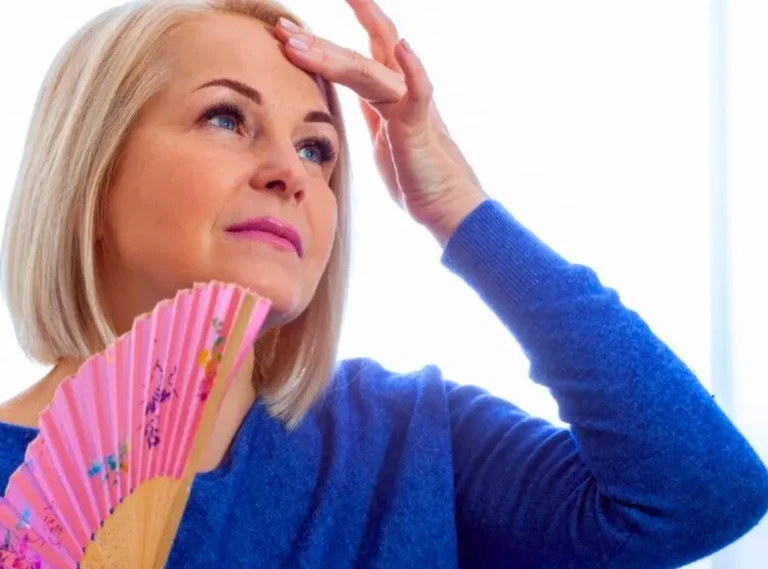
Hot flashes during menopause can be tough to handle. But knowing how to react can really help. They can be unpredictable and mess up your day. Yet, there are ways to manage them well.
Immediate Response Strategies
When a hot flash hits, using cooling techniques can help right away. Try wearing layers, using fans, or cold compresses on your pulse points. Breathing exercises can also calm you down and lessen the hot flash.
Cooling Techniques and Breathing Exercises
Using cold water, ice packs, or a cool shower can quickly cool you down. Breathing exercises, like deep or paced breathing, can also reduce stress and hot flash symptoms.
Preventative Measures
It’s key to know and avoid your personal hot flash triggers. Common ones include spicy foods, caffeine, and stress. Keeping a diary to track hot flashes can help find what triggers them.
Identifying and Avoiding Personal Triggers
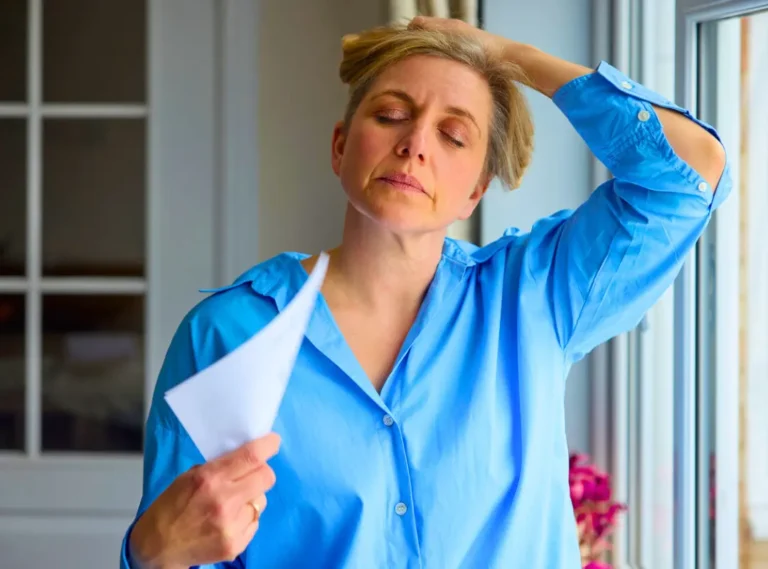
Knowing what causes hot flashes lets you take steps to avoid them. This might mean changing your diet, managing stress, or staying away from places that might trigger a hot flash.
Lifestyle Modifications That Reduce Hot Flash Severity
Managing hot flashes needs a mix of diet changes, exercise, and stress relief. These lifestyle changes can greatly lessen hot flash severity and how often they happen.
Evidence-Based Dietary Changes
Diet is key in handling hot flashes. Some foods can make them worse, while others help.
Foods That Help and Foods to Avoid
Eating foods rich in omega-3s, like salmon, and fiber, such as whole grains, can ease symptoms. Stay away from spicy foods, caffeine, and hot drinks to cut down on hot flashes. A balanced diet with lots of fruits, veggies, and whole grains can really help.
Physical Activity’s Impact on Vasomotor Symptoms
Regular exercise can lessen hot flash severity. It helps keep your body temperature stable and boosts your health.
Optimal Exercise Types and Timing
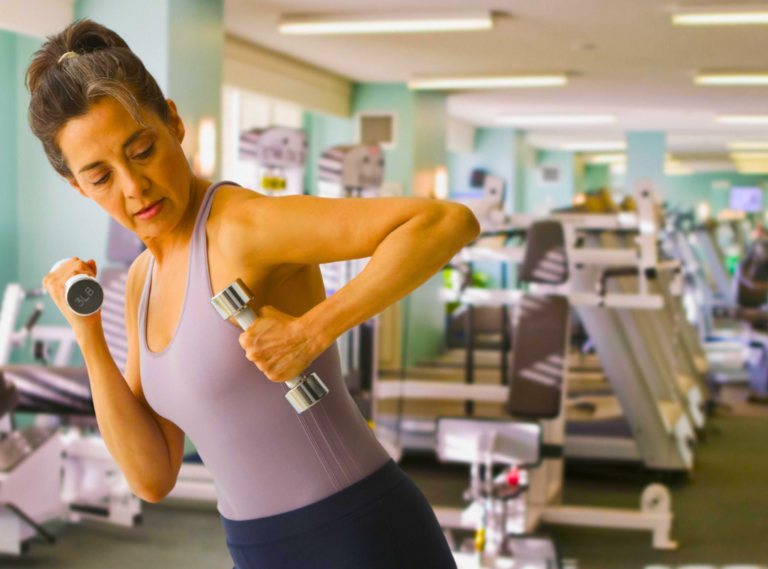
Doing moderate-intensity exercises like brisk walking, cycling, or swimming is good. Think about when you exercise too. For some, morning or early evening workouts help keep your body temperature steady all day.
Stress Reduction and Mindfulness Practices
Stress can make hot flashes worse. So, finding ways to reduce stress is vital for managing symptoms.
Meditation and Relaxation Techniques
Mindfulness through meditation, deep breathing, or yoga can lower stress and ease hot flashes. These practices help you relax and can be part of your daily life. They offer long-term benefits for women going through menopause.
Natural and Alternative Treatments for Hot Flashes

Hot flashes are a common symptom of menopause. They can be managed with natural and alternative treatments. Women often look for ways to ease these sudden waves of heat.
Herbal Supplements with Scientific Support
Some herbal supplements may help with hot flashes. Black cohosh and red clover are studied for their effects. They might help balance hormonal changes.
Black Cohosh, Red Clover, and Phytoestrogens
Research on black cohosh shows mixed results. But, some studies suggest it can lessen hot flashes. Red clover, with its isoflavones, might offer similar benefits. More research is needed to confirm this.
Acupuncture and Traditional Medicine Approaches
Acupuncture is a traditional Chinese medicine technique. It involves inserting thin needles into specific points to restore balance. Some studies suggest it can help with hot flashes, but results vary.
Research Findings and Effectiveness
Some women say acupuncture reduces hot flashes. But, the scientific community is divided. They debate its effectiveness due to different study results.
Cognitive Behavioral Therapy for Hot Flash Management
Cognitive behavioral therapy (CBT) is also promising. It can change how women see hot flashes. This can lessen their impact on daily life.
Medical Interventions: When and What to Consider
For some women, managing hot flashes means looking into medical treatments. Menopause treatment can include different medical options to help with symptoms.
Hormone Replacement Therapy: Benefits and Risks

Hormone replacement therapy (HRT) is a common choice for hot flashes. It adds back hormones that decrease as women get closer to menopause.
Latest Research and Individualized Approaches
New studies have improved our understanding of HRT’s effects. Now, HRT is tailored to each woman, based on her health history and risk factors.
Non-Hormonal Prescription Medications
Women who can’t or don’t want to try HRT have other options. These include SSRIs and SNRIs, which are usually used for depression.
When to Consult a Healthcare Provider
It’s important to talk to a healthcare provider if hot flashes are really affecting your life. They can help find the best treatment for you.
Warning Signs and Severe Symptoms
If you have severe symptoms like heavy bleeding or extreme hot flashes, get medical help right away. A healthcare provider can guide you on how to manage these symptoms.
Managing Associated Symptoms of Menopause
Menopause is a natural part of life, but its symptoms can be tough. Symptoms like sleep problems and mood swings can really affect your life. It’s important to manage these symptoms well.
Night Sweats and Sleep Disturbances
Night sweats can mess up your sleep. Making your bedroom a sleep-friendly space is key. This can help you sleep better.
Bedroom Environment and Sleep Hygiene
Keep your bedroom cool and use breathable bedding. Try relaxation techniques before bed. Stick to a regular sleep schedule and avoid caffeine and screens at night.
Anxiety, Irritability, and Mood Changes
Mood swings, anxiety, and irritability are common in menopause. There are ways to handle these feelings.
Psychological Support Strategies
Cognitive-behavioral therapy (CBT) and mindfulness can help with anxiety and mood swings. Joining support groups online or in-person can also help. They offer a sense of community and understanding.
Weight Management During Hormonal Transition
Weight changes are common in menopause due to hormonal shifts. Healthy habits can help manage your weight.
Metabolic Changes and Adaptation Strategies
Eat a balanced diet with lots of fruits, veggies, and whole grains. Regular exercise, like walking or swimming, helps with weight and health.

Conclusion: Embracing This Natural Life Transition
Menopause is a big change that brings physical and emotional shifts, like hot flashes. It’s key to manage these symptoms to keep women healthy and happy.
Learning about hot flashes and making lifestyle changes can help. This includes eating right and finding ways to relax. Herbal supplements and acupuncture can also offer relief.
For some, medical help like hormone therapy might be needed. It’s important to talk to a doctor to find the right treatment. By tackling menopause symptoms in a full way, women can face this stage with confidence and better life quality.
Using the right strategies and getting support can greatly improve a woman’s health during menopause.
FAQ
What can I take to alleviate hot flashes during menopause?
You can try hormone replacement therapy or non-hormonal meds. Natural supplements like black cohosh might help too. Making lifestyle changes, like eating right and managing stress, can also ease symptoms.
How long do hot flashes typically last during menopause?
Hot flashes can last for years after menopause. On average, they go on for about 7-10 years.
What are some common triggers for hot flashes?
Spicy foods, caffeine, stress, and tight clothes can trigger hot flashes. Knowing what triggers them can help you avoid them.
Can exercise help reduce hot flashes?
Yes, exercise can make hot flashes less frequent and less severe. It also boosts your overall health.
Are there any natural remedies for managing night sweats?
Yes, herbal supplements and relaxation techniques can help with night sweats. Keeping your sleep area cool is also key.
How can I manage anxiety and irritability during menopause?
Stress-reducing activities like mindfulness and deep breathing can help. Cognitive therapy and joining support groups are also good options.
Can menopause cause weight gain, and how can I manage it?
Yes, hormonal changes can lead to weight gain. Eating well, exercising regularly, and managing stress can help control weight changes.
What is the best way to manage insomnia during menopause?
Good sleep habits, like a regular sleep schedule and a calming bedtime routine, are key. Avoid caffeine and screens before bed.
Are there any alternative therapies that can help with hot flashes?
Yes, acupuncture and cognitive behavioral therapy can reduce hot flash severity. Some herbal supplements, like black cohosh, may also help.
Scientific studies:
The physiology of hot flashes
-
Authors: Freedman RR
-
Published in: American Journal of Human Biology, 2001
-
Link: https://doi.org/10.1002/ajhb.1067
Menopausal hot flashes and brain function: an fMRI study
-
Authors: Craig AD et al.
-
Published in: Cerebral Cortex, 2007
-
Link: https://doi.org/10.1097/gme.0b013e3182410159

